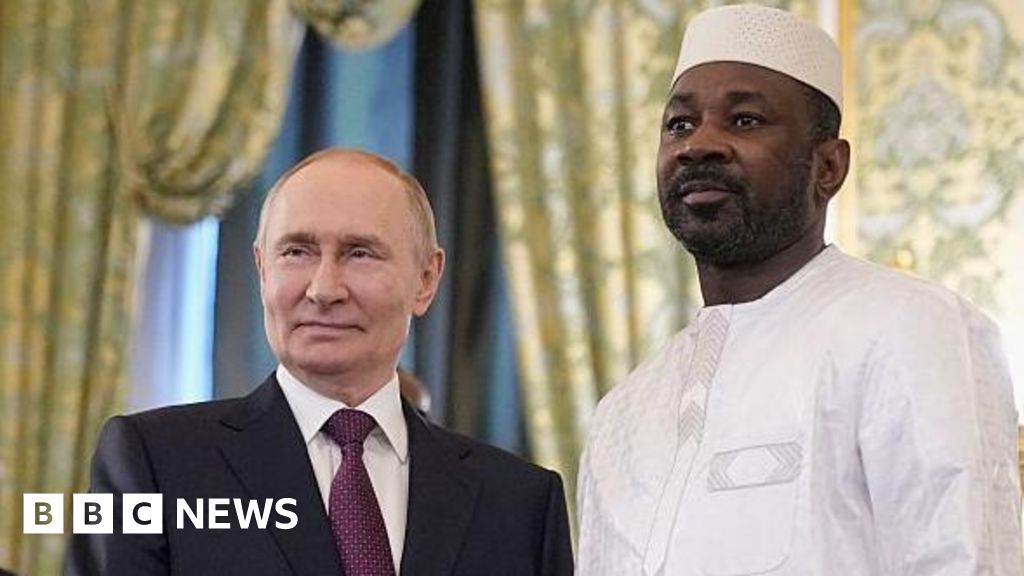Mali signs trade deal with Russia as ties strengthen

Mali Deepens Ties with Russia Through Trade and Security Deals
Mali has signed a series of trade agreements with Russia, solidifying a growing alliance that has seen the West African nation increasingly turning away from its former colonial power, France. The agreements, announced following a visit by Malian junta leader Colonel Assimi Goïta to Moscow, signal deepening cooperation in areas including nuclear energy, geological exploration, and security. The move underscores a broader shift in geopolitical allegiances across the Sahel region, with Russia seeking to expand its influence.
Agreements Focus on Energy and Security
Details released by the Kremlin reveal that the agreements encompass a pledge for enhanced cooperation on nuclear energy, potentially including the construction of a Russian-designed nuclear power plant in Mali. While trade ties between the two countries are currently "modest," according to President Vladimir Putin, both leaders expressed optimism about future collaboration in sectors such as geological exploration, energy, logistics, and humanitarian aid.
Military cooperation remains a cornerstone of the burgeoning Russia-Mali partnership. Russian security forces, previously identified as Wagner Group mercenaries, have been supporting Colonel Goïta's government since the expulsion of French and UN troops. While the Wagner Group has reportedly withdrawn, another force, the Africa Corps, is believed to remain active in the country.
A Pivot Away From the West
Since seizing power in a 2021 coup, Colonel Goïta has actively cultivated closer relations with Russia while simultaneously reducing ties with France, the former colonial power. This shift reflects a wider trend in the Sahel region, where neighboring Burkina Faso and Niger have also gravitated towards Russia after military takeovers. These nations have cited dissatisfaction with Western counter-terrorism efforts and a desire for greater sovereignty as key drivers of their reorientation.
Expert Analysis: Implications for Regional Security
"The deepening relationship between Mali and Russia represents a significant challenge to traditional Western influence in the Sahel," says Dr. Bakary Sambe, Regional Director of the Timbuktu Institute, a Dakar-based think tank specializing in peace and security in the Sahel. "It also raises concerns about human rights and accountability, given the Wagner Group's track record in other conflict zones. The focus on security assistance from Russia, while addressing immediate concerns, risks undermining long-term stability by neglecting governance and development needs."
Historical Context: France's Troubled Legacy
France's military intervention in Mali in 2013, under Operation Serval, initially aimed to combat jihadist groups that had seized control of northern Mali. While the intervention prevented the collapse of the Malian state, it failed to address the underlying causes of the conflict, including weak governance, corruption, and ethnic tensions. The prolonged presence of French troops, coupled with allegations of human rights abuses, gradually eroded public support for the mission, creating an opening for Russia to step in as an alternative security partner.
Current Challenges: Worsening Security Situation
Despite promises to improve security, violence in Mali has worsened in recent years. The expansion of jihadist groups, inter-communal conflicts, and human rights abuses by security forces continue to plague the country. The United Nations has repeatedly expressed concern about the deteriorating human rights situation and the lack of accountability for alleged abuses.
Russia's Expanding Footprint in Africa
Mali is not the only African nation where Russia is seeking to expand its influence. Moscow has actively cultivated relationships with governments across the continent, offering security assistance, economic partnerships, and diplomatic support. This strategy has been particularly successful in countries facing political instability or strained relations with the West.
Central African Republic: Russian mercenaries have been providing security for the government in exchange for access to natural resources. Sudan: Russia has been seeking to establish a naval base on the Red Sea. Libya: Russia has supported various factions in the ongoing civil war.
Critics accuse Russia of exploiting instability and undermining democracy in Africa, while proponents argue that Moscow offers a valuable alternative to Western dominance and provides much-needed security assistance to countries facing complex challenges.
Analytical Viewpoint: A New Scramble for Africa?
According to Professor Paul Melly, Consulting Fellow at Chatham House's Africa Programme, "The growing involvement of Russia, alongside other actors like China and Turkey, suggests a new scramble for influence in Africa. This competition presents both opportunities and risks for African nations. While it can provide greater leverage and access to diverse sources of investment and security assistance, it also risks exacerbating existing conflicts and undermining efforts to promote good governance and sustainable development."
The evolving relationship between Mali and Russia will undoubtedly continue to shape the political and security landscape of the Sahel region and beyond. The long-term implications of this alliance remain uncertain, but its potential to reshape the balance of power in Africa is undeniable.
Originally sourced from: BBC News Africa
